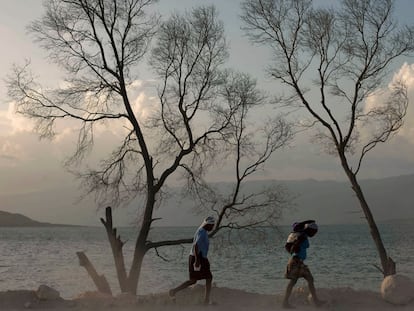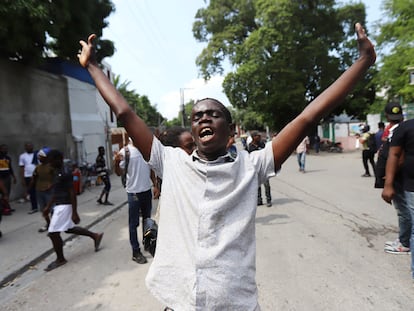Haiti, when a state collapses
It’s a country with nobody in charge. After decades of dictatorships and natural disasters, the capital of Port-au-Prince is now ruled by criminal gangs. Every day, at least 18 acts of extreme violence take place. EL PAÍS chronicles a week in a hell from which everyone wants to flee
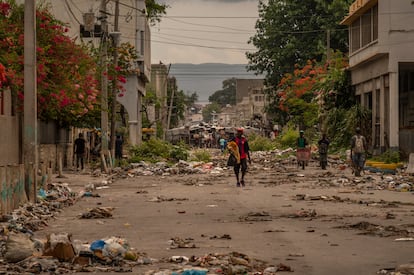
Some mornings, when she leaves her house for work, Lude must avoid the street and cross through her neighbors’ properties, climbing the walls that separate them, until she can get out of Clercine, her neighborhood. Once she makes it out — after several jumps — she can finally walk normally and take the taptap, a kind of minibus that will take her to the office.
Lude — the pseudonym given by this 30-year-old woman — allows her neighbors to do the same with her property. It’s like a solidarity agreement. On some morning in Clercine, men and women — wearing shirts, ties and skirts — scale the walls to get out of their own neighborhood. This cruel reality is representative of Port-au-Price, the capital of Haiti. Clercine is on the frontlines of the battle, situated along the border between two gangs that aspire to control the area. Chen Mechan — which could be translated from Creole (the country’s official language) as “crazy dogs” — and 400 Mawozo are the two street gangs fighting over territory. Sometimes, they shoot each other with rifles and pistols. They go on patrol, looking for people to rob. During these moments of strife, Lude and her neighbors scale the walls to avoid trouble.
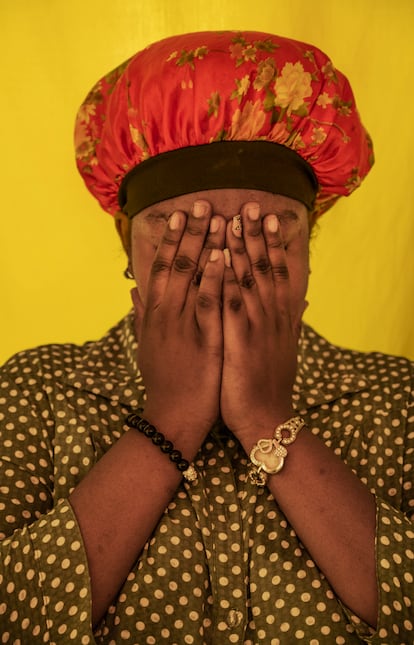
Lude once lived in another nearby neighborhood, La Croix-des-Bouquets. One morning in 2019, she was walking with her uncle when two gang members approached them. They stole everything. Once they were done, they shot Lude’s uncle in the face. “For the pleasure of it,” she recalls. Her mother heard the shots from home. After that murder, Lude and her family moved to Clercine. Years later, the confrontation between the two armed groups began. Specifically, on the night of April 23, 2022, when hundreds of residents were killed indiscriminately. “A massacre,” says Lude.
“If they told me a few years ago that I would have to [climb over walls to get to work], I wouldn’t have believed it,” says Lude, sitting in a church pew. She has chosen this place to speak, away from the surveillance of the gangs. To get here, we had to go look for her in Clercine. But as we arrived, she called us: “Don’t come. Wait for me two streets down. The gangsters have set up a checkpoint.” We pulled over.
She tells us that life in Port-au-Prince is impossible. “It’s not life,” she whispers. “The gangs have taken control — we have no police or rulers. There are kidnappings, gunshots... I don’t do anything other than be at home or at work. There’s no future in this country.”
“I miss being able to go down the street, to be able to go out, to walk calmly. I miss not being afraid,” Lude sighs, before saying goodbye.
“If you could, would you leave the country?”
“Tomorrow. Sorry — today. I would leave today.”
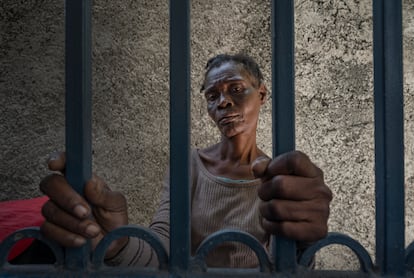
There’s a war in Port-au-Prince. There are frontlines, armed groups and displaced civilians. Women and girls are raped; men are killed by the thousands.
The only difference is that this war has not been declared. Not officially, at least. And this has huge downsides, the main one being that no foreign country is helping Haitians while their country bleeds to death.
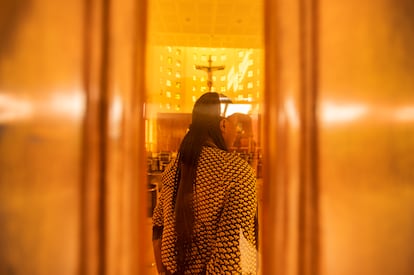
The root of the problem can be found in the almost-total absence of the state. This societal collapse began in 2010, in the most symbolic way possible: a devastating earthquake left Port-au-Prince in ruins, with more than 300,000 people dead. It was a macabre finishing touch to what was already a drift inherited from the 1960s, when François “Papa Doc” Duvalier set himself up as dictator for life. He was succeeded 20 years later by his son, “Baby Doc.” Between the father and son, they launched a regime of terror that, according to the United Nations, left at least 50,000 dead in the country. The secret police — known as the Ton-Ton Macoute (boogeymen) — continued to kill even years after the Duvalier regime ended, in the form of paramilitary groups. Despite the arrival of democracy, instability and corruption became entrenched in Haiti.
In August 2021, another devastating earthquake hit the country. And, just one month earlier, then-president Jovenel Moïse was assassinated by Colombian mercenaries in his home — an attack in which political intrigue, business interests and affairs that begin in Haiti and end in Washington were mixed. From that day until the present, Haiti has been without a head of state. There isn’t a single elected member of parliament. In fact, the legislative building doesn’t even exist — it collapsed during the earthquake and was subsequently abandoned. On paper, Prime Minister Ariel Henry is the acting head of state, although he’s surrounded by a very small clique, with the majority of the population opposed to him. In Haiti, in real terms, nobody is in charge.
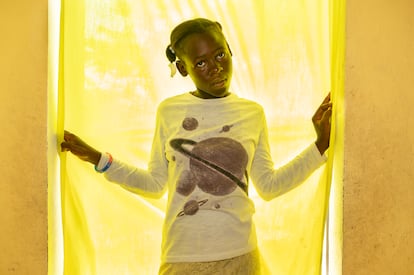
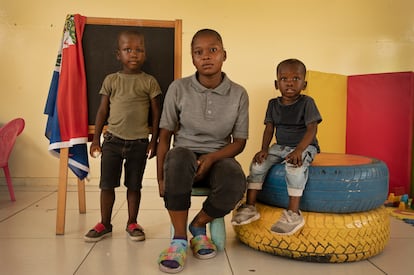
There are no public sanitation services, there aren’t enough police and there’s hardly any healthcare infrastructure. Almost half of Haiti’s population is experiencing hunger, according to the latest report from the World Food Program. There are no trials: 85% of the prisoners haven’t gone through the courts, which are paralyzed. There isn’t even power: the country relies on generators that it obtains from a private company owned by one of Haiti’s elite families. Haiti has collapsed, but business can always be done.
When one arrives at the Port-au-Prince airport, one becomes fully aware of the dire situation. There’s only one plane on the runway. Inside the terminal, the corridors are dark and empty. A listless customs officer silently stamps passports. The uncertainty of lawlessness begins as soon as you leave the airport.
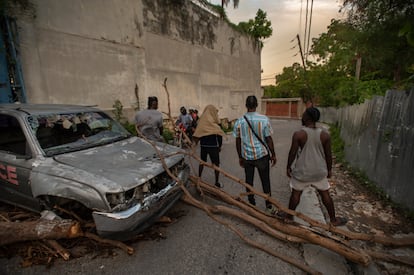
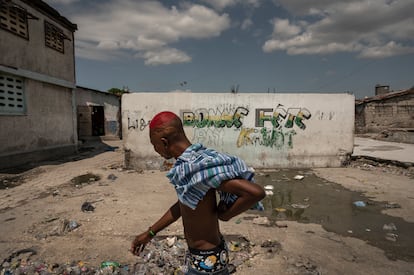
Yuri Mevs — a businesswoman and member of the Haitian oligarchy — lives this situation from above. Literally — geography is also metaphorical in Port-au-Prince. High up, in the mountains of Pétion-Ville — the district where the capital’s wealthiest neighborhood can be found — three-story mansions with swimming pools rise above shanty towns, displaying a graphic contrast. Some 20 families make up Haiti’s elite, almost all of them of European and Arab origin. They control the main companies and political parties. They spend the weekends in their second homes in Miami or New York, where their children usually study. An army of private security companies patrols this area, keeping reality at a distance.
Mevs runs Shodecosa — the country’s largest industrial park — located in Cité Soleil, the poorest district of Port-au-Prince. “I don’t want to, but if things don’t improve, I will have no choice but to sell what I have and leave. My daughters will do the same. The situation here is close to untenable.”
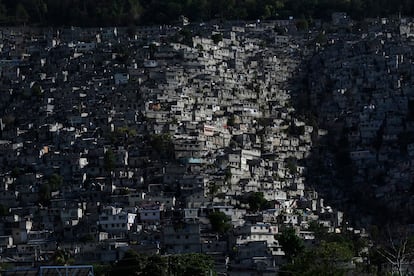
At the foot of the Pétion-Ville hills, the city is tortuous. Hostile. If it doesn’t rain, a layer of white dust forms under the enormous sun — a kind of photographic filter that turns the streets into a blurry and confusing landscape, like the images of a dream. If it rains, the city becomes a quagmire, where garbage and mud fuse together. The streets are full of potholes, where pools of dirty water form. There are mountains of rubbish everywhere, with goats and pigs eating from them. Battered cars, noisy motorcycles, unbreathable street markets, collapsed buildings, broken traffic lights (not a single one works in the city), stagnant green water at the entrance to a supermarket... nobody has been hired to clean up, nobody regulates traffic, nobody repairs the damage. Nobody takes care of Port-au-Prince.
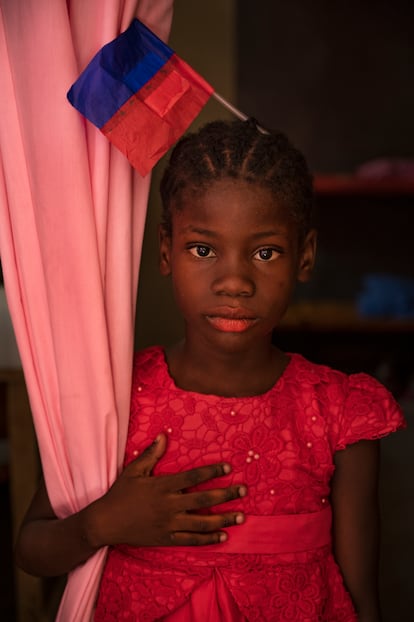
“The state is absent,” summarizes Milo Milford, 36, an independent Haitian journalist. He receives us in a small and modest office, where he works on pieces for various media outlets. He belongs to a middle class that is practically extinct in the country. “Almost everyone has left. The Haitian diaspora is immense. Those of us who stay do so out of militancy. So much so that, if the diaspora stopped sending money tomorrow, Haiti would go bankrupt in 24 hours.”
This diagnosis is shared by Maryse Pénette-Kedar, president of the Progress and Development Foundation. She’s one of the cultural engines of the city: her living room is open for gatherings, lectures and debates. “The most essential people have left,” she explains. “In this country, there are only the poor — who cannot help — and the rich, who don’t want to.”
“The consequence of the disappearance of the state is that the armed gangs have taken its place,” Milo says. More than 60% of Port-au-Prince is controlled by these groups. In some neighborhoods — such as Martissant and Bel Air, very close to the downtown — the police haven’t been around in months. The residents live under gang rule. If they have any problem or request, they must go to the gang leaders, who tax business and even issue permits to build or repair homes. They act as a proto-state.
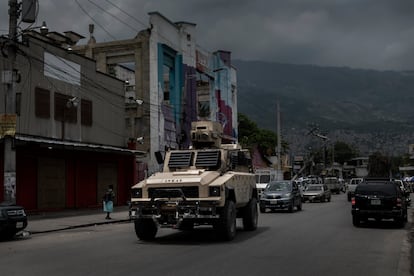
Other neighborhoods aren’t strictly controlled by gangs and there is a police presence. But this doesn’t mean that they’re free of incidents — gangs come out at night on patrol and attack anyone they come across. It’s estimated that there are about 160 armed gangs in Port-au-Prince. There are hardly any zones free of violence. According to a report by the United Nations High Commissioner for Human Rights, between January and March 2023, 1,634 violent assaults — including murders and rapes — took place in Port-au-Prince. More than 18 episodes of extreme violence a day. Once the sun goes down, an unspoken curfew goes into effect. Leaving home at night simply doesn’t make sense in Port-au-Prince.
The two most powerful gangs are G-PEP and G9 & Family. The latter is an alliance of various gangs led by Jimmy Chérizier — alias “Barbecue” — a well-known figure in Haiti who gives press conferences, amasses millions of dollars and has even blocked the city’s port, preventing the entry of goods and food. Barbecue is seen by many as the future mayor of the city — there have been public calls to distinguish between criminal gangs and armed groups driven by ideology. The latter groups are well-organized bodies, heavily armed with both weapons and political discourse. Barbecue — more than the leader of a gang — is almost like a military leader.
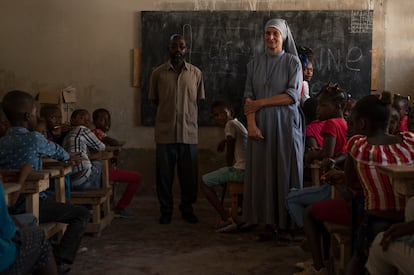
To enter a neighborhood controlled by a gang, you need the permission of their boss. In Boston — a neighborhood in the heavily punished Cité Soleil district — Matias is in charge. He’s a well-dressed young man who drives a white SUV with tinted windows over dirt roads and potholes. His gang is part of the G9. Thanks to the Salesian parish priest of the neighborhood, Matias gives us the green light to visit his territory. We do it accompanied by Daniel, his lieutenant.
Boston — like almost all of Cité Soleil — is a neighborhood made up of shacks and humble houses, where the garbage scattered along the streets. In some areas, it’s knee-deep. It’s been two years since a policeman has set foot here. “If he did, he’d be killed. In an instant,” Daniel calmly explains. In the background, there are shots coming from Brooklyn — the next neighborhood over, which is controlled by G-PEP, the rival gang. Three walls separate both areas. If someone even comes close to the border, there’s a good chance that they’ll be shot.
In Boston, we meet Sister Paësie — a French nun who has lived here for more than 20 years. She has rented a house in the middle of the neighborhood and — thanks to private donations — is dedicated to rescuing street children and welcoming them into the homes and schools that she herself has built as part of her Famille Kizito mission. Sister Paësie tries to get the head of the G-PEP to admit us to Brooklyn, but the answer is a firm “no.” If you’ve been in rival territory, it’s not feasible to cross the border.
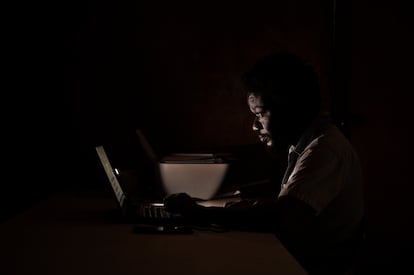
Sister Paësie has to talk to gang leaders because, in these districts, they are the state. “International agencies, NGOs, or ambulances don’t enter here. When there’s a corpse, [the gangs] notify me, so that I can take it out of the neighborhood and they can pick it up,” she explains. “It’s true that, for some time now, [the corpses] have been burned. Don’t believe that it’s for health reasons — they do it because, according to their magical beliefs, if you don’t burn the dead body, it can take revenge on you in another life. Along with God, everyone here believes deeply in voodoo.”
Sister Paësie shows us one of the shelters. At the entrance, dozens of women crowd around, waiting to ask for help. “Every day, I have no less than 10 requests from mothers who want to leave their children here.” In the house, Sister Paësie introduces us to a smiling young woman. “She’s been hiding here for two years: a gang leader wants her to be his wife and we’re protecting her.” The last threat to the girl was sent by the boss through her sister: he raped her and told her that he hadn’t forgotten about her. “Some families sell their daughters to the gangs, so that they can be supported financially. It’s pure survival,” Sister Paësie concludes.
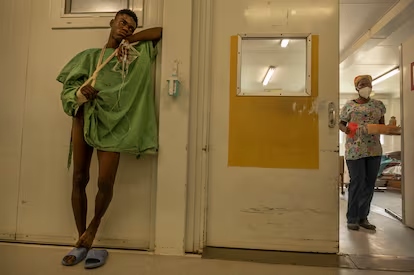
In Waf Jeremie — another forgotten neighborhood, south of Cité Soleil — Elio speaks to us. He’s a Brazilian missionary from Belém Mission. He shows us the hospital that they’re building. “You can only do this if Mikanó gives you permission,” he explains. Mikanó is the head of the gang that controls Waf Jeremie — he’s the one who has authorized our entry. He’s famous in the city: according to a local journalist, he proclaimed himself king a few weeks ago — he ordered the construction of a castle in the neighborhood and a throne on which he sits. Mikanó has also demanded that all the adolescent girls of War Jeremie lose their virginity to him. “It can be said that this guy has raped all the girls in the neighborhood,” the journalist laments.
We ask Mikanó for an interview, but he refuses. He later agrees… but in return, he wants $10,000. “These bosses are millionaires. They drive high-end cars, wear the best sneakers and record video clips. The kids are fascinated by them,” explains Elio, after informing the boss that we’ve declined his proposal.
Joseph Inerrimen is 19-years-old and belongs to the G-PEP gang. He is in a Doctors Without Borders (MSF) hospital because, a few days ago, he was shot while riding a motorcycle. We ask him if he’ll return to his neighborhood when he recovers. “Where else would I go?” he snaps, his expression angry and disgusted. We ask him how long he’s been in his gang. “Since I was born,” he replies.
“Here, there’s no authority or control,” Elio affirms. Again, the absence of the state appears. “Most of the locals eat only once a day… it’s very rare to find a 17-year-old girl who’s not a mother. Many people don’t even have a birth certificate: officially, they don’t exist.”
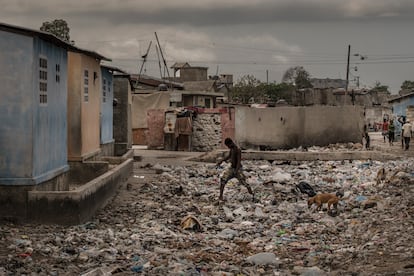
The most explicit symbolism of gang power is found in the center of the capital, the political and financial heart of Haiti. The G9 has controlled it for months — it’s impassable. On a visit to its edges — marked by the Champ de Mars square — we see streets that are covered with rubbish and emptied of people. The residents have been gone for months. The paradox is brutal: here is where the City Hall and the government ministries are located. All empty and unapproachable. The prime minister’s office is also here, which offers the most symbolic image: the occupant of the office hasn’t been able to enter for a long time. The only building in operation is the Bank of the Republic — the police keep it accessible to avert the total collapse of Haiti. From Monday to Friday, between 8 a.m. and 5 p.m., the agents form a corridor along Casernes street, to allow bank workers to reach the building.
Haiti has lost its heart. The gangs have controlled it for months. The problem — just one of them — is that most of these gangs are at war, turning Port-au-Prince into a literal battlefield. The shootings are constant. It’s very rare to travel through the city without hearing shots from time to time. One gets used to it in a few days. The locals are unfazed.
When two warring gangs control adjacent neighborhoods, problematic borders are created, such as Boston and Brooklyn. Sometimes, these fractures are physical: numerous Port-au-Prince neighborhoods are separated by walls, barricades and checkpoints, which are controlled by gang members who are armed with rifles. Without permission, you cannot enter. A resident of one neighborhood cannot access another: if they did so without permission, they would be assassinated, accused of spying or collaborating. This is what day-to-day life is like in the Haitian capital.
Richemor is 18-years-old. He’s a student in one of the professional training courses given by the Salesian Don Bosco mission in Haiti. The school is located in La Saline — a very poor neighborhood controlled by a gang that is part of the G9 alliance. The problem is that he lives in another neighborhood controlled by the G-PEP, the rivals. Every day, he has to cross three borders — three checkpoints, guarded by armed men — to get to school. The journey takes more than two hours. “At the crossing points, they know me — that’s why they let me continue. But there are many days that I can’t reach, because there’s a battle and there’s shooting. On those days, I don’t go to class,” he says, while sitting in the school.
All the residents of Port-au-Prince have a very clear map in their heads. They know which neighborhoods are accessible and which are not. Where there are police and where there are gang members. They know which street they can walk through and when to turn around. They usually divide the city up into red (prohibited), yellow (there are gangs, but there’s also a police presence) and green zones. A neighbor replies: “Green? There have been no green areas in Port-au-Prince for years!” Memorizing this map is truly a matter of life and death.
Milo the journalist says that, on many occasions, it has been impossible for him to return home from the office. “I have everything prepared here in the newsroom to be able to spend up to two weeks [inside]. It’s already happened to me several times,” he explains, showing us the small kitchenette and the bed.
This isn’t an extraordinary case. Many residents of Port-au-Prince sleep at their jobs — the crossfire prevents them from returning home.
Episodes of gang violence reach their peak when one group decides to occupy a neighborhood. They take no prisoners: gang members consider residents to be potential enemies and kill as many as they can. Port-au-Prince has experienced massacres typical of a war.
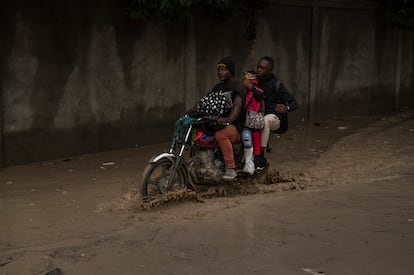
On May 24, Danielle Lamothe, 54, a widow, was sleeping at home. In the next room was her 18-year-old son. It was around 2 a.m. in the Canape Vert neighborhood, a quiet area south of the capital. As if taken from a horror script, suddenly, Danielle heard noises in the distance. In the shape of a wave, the murmur grew closer, until it entered her bedroom: motors, shots, terrible screams. Danielle sat up — as she walked out of her room, a crash of glass exploded in the living room. “My son came out of his room and we hugged as they banged on the door to try to break it down. Since they couldn’t knock it down, they shot at the lock,” Danielle says, from her bed in an MSF hospital. One of those bullets hit Danielle’s shoulder. Next to her, dozens of men, women and children are lying in hospital beds, all shot.
MSF explains that in their hospital alone, they treat more than 10 patients wounded by gunshots every day. “In my neighborhood there were never gangs. I thought that was in other areas of the city,” Daniella says. But it happened: on that night, the Ti Makak gang — from the Laboule 12 district — tried to take control of Canape Vert. Hundreds of residents were murdered. Today, many parts of the neighborhood remain empty. “I’m not going back,” Danielle declares. Bel Air, Martissant, Delmas 6, Bicentenaire, dozens of neighborhoods in Port-au-Prince seem to be abandoned movie sets. Ghost towns where activity was bustling not so long ago. No state presence, no residents. Lifeless.
In reality, the gangs that control these forgotten slums and mountain mansions aren’t that far away. According to Milo Milford, some of the families of the Haitian oligarchy finance the gangs, supplying them with weapons and using them to destabilize the country. “Security isn’t a priority for them. The struggle for power comes first. And, in that struggle, the armed wings are the gangs.”
But the monster has now been overfed and threatens to devour them all. “For months, the gangs have been out of control. Not even the richest families are safe,” explains Patrice Dumont, a former senator who receives us in his residence. A rain of kidnappings has gripped the capital: between January and March of 2023 alone, 389 kidnappings took place in the country, according to data from the Center for Human Rights Analysis and Investigation (CARDH). Almost five kidnappings a day, which makes for a huge source of financing. Scientists, teachers, journalists, businessmen and doctors travel through the city at full speed, in cars with tinted windows, and with the mental map ever-present. “The targets of the kidnappings are precisely the people that Haiti needs the most. And they’re all leaving,” Dumont concludes.
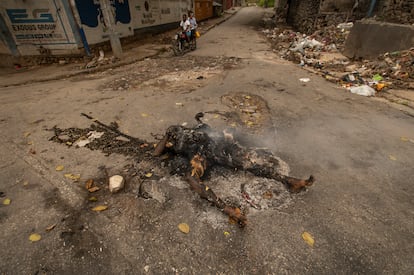
Since the end of May, the circle of violence has been closed by the Bwa Kale movement. This organized reaction has come out of several neighborhoods, especially those that never lived with gangs before and that, today, are being threatened. The movement was born in Canape Vert — precisely the night that Danielle Lamothe’s house was attacked. The day of violence ended with a mob of local residents taking the gang members out of the police station where they were being held to lynch and burn them. Since then, groups of residents have controlled the neighborhood, setting up checkpoints with barricades. They are called “watchmen.”
This vigilante movement has spread to nearby neighborhoods. In Pacot, we come across one of these barricades. A tree and a semi-dismantled truck block the way — the young people manning the checkpoint shout at us to stop. They approach and run a metal detector over us — they ask us questions, but the sound of gunshots distracts them. A few streets up, a reported gang member has been shot down. The body is tied to a motorcycle, dragged to the entrance of a supermarket and burned. The torched body will remain there for 24 hours, as a warning, while pedestrians and cars go about their business.
Again, for the umpteenth time, we witness the absence of the state: neighbors who get organized, to defend themselves in the face of police ineffectiveness. More violence in a city that has reached its limit. Port-au-Prince is truly a lawless land. And, for now, no one seems to care. The collapse of Haiti continues.
Translated by Avik Jain Chatlani.
Sign up for our weekly newsletter to get more English-language news coverage from EL PAÍS USA Edition
